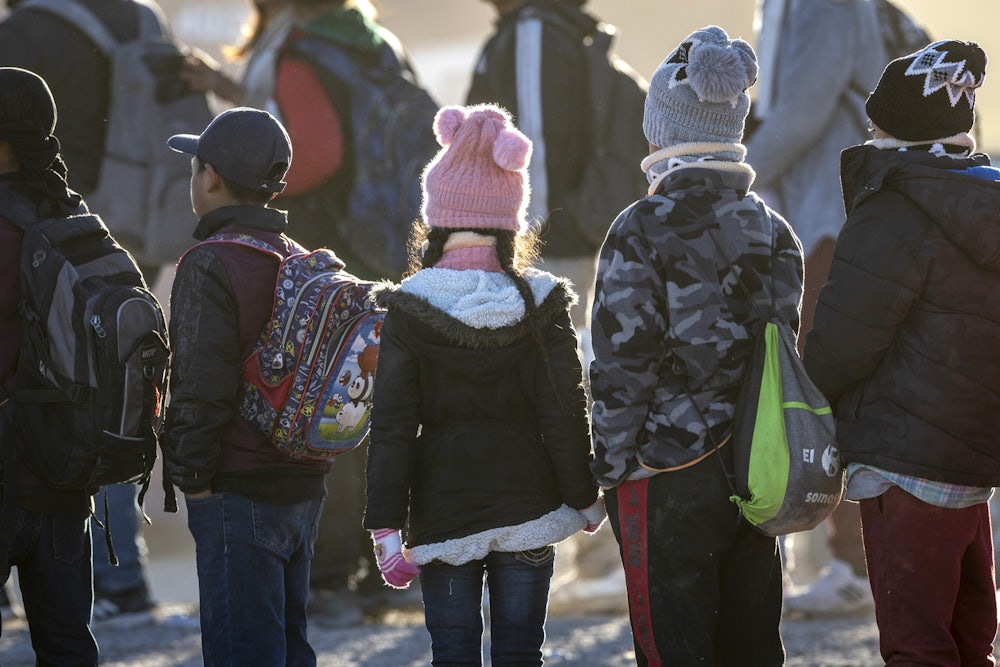Over the coming decades, experts estimate that upward of a billion people could be displaced by the effects of climate change. A great many of those people will attempt to cross the border between the United States and Mexico. It’s easy to imagine how Republicans will respond: ignore or deny the fact that temperatures are rising and batten down the hatches. They’ll further expand a cruel and bloated border security apparatus that traps, tracks, and terrorizes desperate people fleeing impossible situations.
But what this week’s debacle over the bipartisan border deal has made clear is just how willing Democrats are to take the same approach. The “deal” that fell through Tuesday evening went like this: Senate Democrats decided to use migrants as a bargaining chip to extract $60 billion in military aid to Ukraine. The package also included $14.1 billion in unrestricted military aid for Israel to continue its brutal war on Palestine, which the International Court of Justice has said could plausibly constitute genocide. To secure aid for Ukraine—a tougher sell for Republicans—they handed the GOP a long wish list of its favorite hard-line immigration policies, extracting precious few laudable gains like permanent status for Afghan refugees, an expansion of work visas, and legal representations for unaccompanied minors. The $20 billion immigration package would have given the president authority to summarily deport migrants once “encounters” reach a numerical threshold; raised barriers to asylum; and offered Immigration and Customs Enforcement, or ICE, $3.2 billion to build new prisons and $2.5 billion for deportation flights. After Donald Trump signaled he’d like that bill to fail, Republicans killed it.
Top Democrats professed their shock once the GOP announced their intent to sink the package. As Senator Brian Schatz wrote Tuesday on X, formerly Twitter: “Just gobsmacked. I’ve never seen anything like it. They literally demanded specific policy, got it, and then killed it.” Connecticut Senator Chris Murphy was similarly aggrieved. “I still believe that when people say things in this body they mean what they say. And I do believe that the border is a mess,” he complained on the Senate floor. “My party actually wants to fix the problem at the border, and we are willing to reach out across the aisle and find a compromise to do it.” President Biden—who backed the deal—chided Trump for opposing “the toughest, fairest law that’s ever been proposed relative to the border.” Biden has now pledged to spend “every day between now and November” explaining that former President Trump and his GOP allies in Congress are the “only reason the border is not secure.”
To summarize: In order to fund foreign wars, Democrats caved to Republican demands and established a bipartisan consensus on immigration based on “long-time GOP priorities that the party’s restrictionists could never have passed,” per one glowing Wall Street Journal editorial. Republicans blew the deal up anyway. And in response, Biden declared his intent to orient his entire reelection campaign around terms created by Donald Trump. To succeed on that terrain, he would have to convince swing voters that Democrats are in fact tougher on immigration than the GOP, large swaths of which take their inspiration on the matter from fascist screeds like The Camp of the Saints.
It’s politically stupid and morally repulsive. Migrants aren’t a simple and monolithic problem in need of a solution, but rather people from vastly disparate backgrounds facing an array of extraordinarily difficult conditions—including a humanitarian crisis along this country’s southern border. Implicit in the very language of a “border crisis” is that there is some problem population that a border is failing to rebuff. The obvious solutions to a problem presented this way are violent ones: fortifying the border with more armed personnel, weapons, and surveillance technologies so that it can repel as many people as possible. Democrats have accepted this framing for a long time, of course. Neither party has shown much of an interest in recent memory in figuring out why people are forced to leave their homes in the first place.
What’s particularly disturbing about this week’s ordeal, though, is just how little the people on the receiving end of immigration policy seem to matter to the Democratic pundits and politicians looking to score political points off of it. Having already treated the lives of migrants as a poker chip to fund foreign wars, party leaders are ginning up an arms race with Republicans over who wants the toughest crackdown. “I’m here in the Senate demanding a secure border,” Senator John Fetterman boasted, “and they won’t take yes for an answer. Who wants an open border now, Senate Republicans?” The White House sent out a memo to reporters along the same lines: “Will the House G.O.P. vote with the Border Patrol to secure the border, or with Donald Trump for more fentanyl?” As ever, the result of all this will be to keep dragging the conversation about immigration ever further toward the right’s hellish vision of a country proudly hostile to outsiders.
The White House’s strategy here (if you can call it that) would be craven and stupid in any context. On a planet where people are being regularly displaced by the effects of climate change, it’s profoundly reckless. Climate migration is not some far-off concern: A study released last year found that drier-than-usual growing season weather was a predictor of emigration from Central America to the U.S. between 2012 and 2018. Hurricanes—like those that pummeled Honduras in 2020—level homes and fields, making people more vulnerable to threats they might have faced otherwise. Countries on the losing end of punishing U.S. sanctions, like Cuba and Venezuela, face even tougher roads to recovery from climate-related disasters.
The U.S. hasn’t exactly been forthcoming with funds that might allow more people to remain in their home countries and recover from storms, floods and droughts. The U.N. only agreed to establish an international fund to help countries rebuild from climate-related disasters in 2022, after climate-vulnerable countries managed to overcome years of obstruction from the U.S., especially. The fund has struggled to get off the ground thanks to more subtle forms of sabotage from the U.S. and rich countries reluctant to put down cash. Between 2013 and 2018, the U.S., Germany, Japan, the U.K., Canada, France, and Australia together spent more than twice as much on border and immigration enforcement than on climate finance.
Immigration policy is climate policy. Party leaders egging on a cynical fight with Trump over the border are laying the groundwork for eco-apartheid. Continually ceding the terms of the immigration debate to the GOP—that is, failing to outline any cohesive, compassionate vision of their own—means allowing the right to set the terms for how this country will greet the growing numbers of people driven here by rising temperatures. Whatever game of 12-dimensional chess Democrats imagine themselves to be playing is naïve and shortsighted at best. At worst, it shows an alarming disregard for the very real suffering of very real people.
Democrats lost a dumb bet this week, wagering that Republicans wholly uninterested in allowing Democrats to govern would furnish military aid in exchange for their hard-line immigration agenda. They’ll lose their humanity too if they keep treating the lives on the other end of that agenda as partisan cannon fodder.








